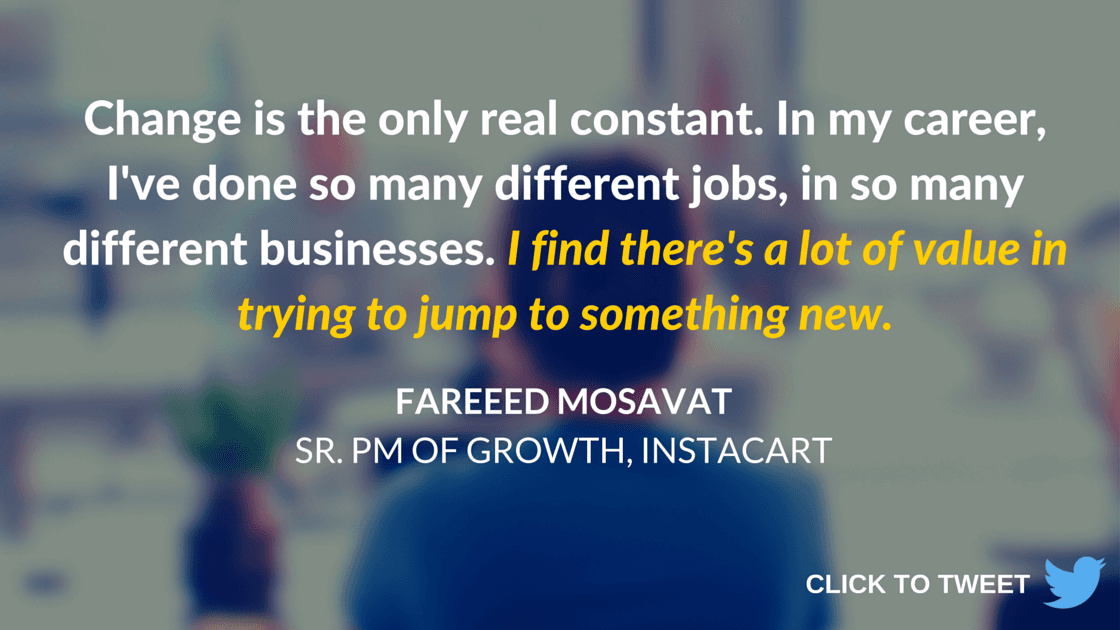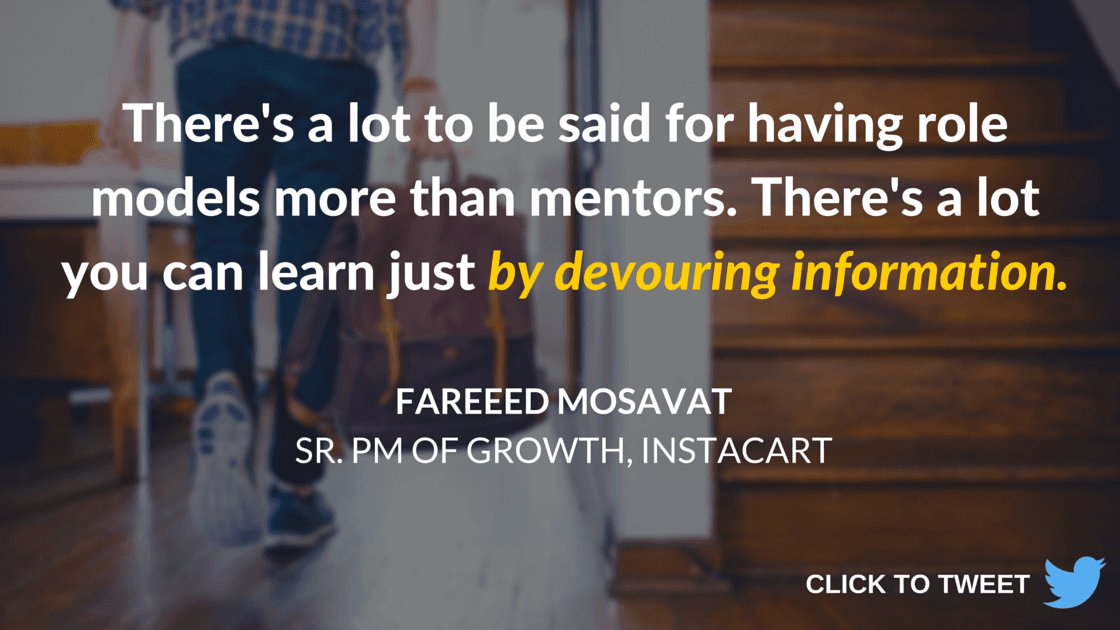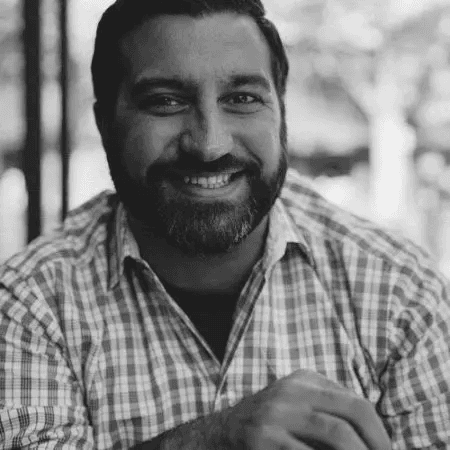Fareed Mosavat on ‘Being a Product Person Through and Through’
With over a decade of engineering experience and far-reaching achievements in growth, few people have touched as many disciplines and verticals as Fareed.
Today we’re excited to share our very first _Datamonster of the Month _story**.**_ The Amplitude Datamonster of the Month series is our way of spotlighting product and growth experts who have made data a central part of their success. Through their stories, we hope to empower other industry professionals with proven analytics strategies and advice for leveraging analytics across their organizations._
_We select our Datamonsters based on the impact they have at their respective companies. This ranges from how these individuals enable their entire organization to be data-informed to how they leverage analytics to make meaningful product and marketing decisions. _
Our Datamonster stories will be shared on our blog at the start of the month, and we’ll chat with each Datamonster during a live webinar called “Datamonster Dialogues.”
This month, I sat down with our very first Datamonster of the Month Fareed Mosavat, Senior Product Manager of Growth at on-demand grocery delivery company Instacart.

From computer graphics at Pixar to growth at Instacart
Throw in a couple search terms related to growth or product management into Google and you’ll quickly realize there’s no dearth of tips on how to hack and slash your way to hypergrowth. But today’s true growth experts–like Fareed–started years before “growth” was even a thing. When I asked Fareed how he ended up in the field of growth and product, he chuckled, saying, “Well, I took a pretty circuitous route here.”
Fareed graduated with a degree in computer science from Brown University and worked on computer graphics at Pixar for seven years. He built the physical simulation network that was used to animate vehicle motion. You probably didn’t know it, but his work was used throughout the film Cars, WALL-E, Finding Nemo, Up, and is still used in all Pixar feature films to this day.
“I thought software engineering was what I was going to do with for the rest of my life,” said Fareed. Pixar felt like home, like a place he could spend the rest of his life. But that didn’t happen. “After a couple films, I realized that I just had this aching to try something new,” he admitted.
Though he’d just missed the dot-com boom, the aftermath–and the later emergence of Web 2.0–left a significant impression on him. The web was the future, and that was where he wanted to be.
Stepping into the world of startups
Right around the time Y Combinator was founded, Fareed turned to the world of startups, looking for a way to transition his software engineering experience into the worldwide web. He spent two years at Boston-based social games startup Conduit Labs, which was later acquired by Zynga. “Game companies on the web was a new field that didn’t really exist,” Fareed explained. “It was an opportunity to use some of the expertise I had in character animation and other things like that to get a foot in the door.”
Fareed first started out building art tools and other things he had experience in; he later ended up doing, well, a little bit of everything. “I was working on server stuff. I was working on web stuff. I build our first web front-end for one of our games,” he said.
And, of course, if you’re working at a growing social gaming company, it’s impossible to ignore analytics. Sure enough, Fareed soon had his hands in that too. He said to me: “We immediately realized in social gaming early on that we didn’t know anything about what our users were doing. We started looking into analytics tools and what we could do for data analysis. I ended up building the first set of our data tracking of all of our games.”
I think if you are looking for change and you don’t know what that change is, just find yourself a job that you can be hired for in a startup and you’ll probably find the change naturally on the other side.
Moving into growth and product
At Conduit Labs, Fareed started building their first rudimentary growth and analytics tools in-house, storing data on their own databases. “We were just kind of hacking it together,” he said with a laugh.
He did their first sets of cohort analysis, measured growth metrics, and built out their early invite flows. The more time Fareed spent building analytics and thinking about what the data was telling him about their users (and their product), the more interested he became in growth itself.
After Conduit Labs pivoted to building social games for Facebook, Fareed transitioned into what essentially constitutes a growth product management role today. “I ended up moving more and more toward talking about our data, analyzing it, understanding it, making recommendations, and grew into a product role just by default,” he said. “I was about fifty percent engineering, fifty percent what you would now call product.”
It was in 2010, when Conduit Labs was acquired by Zynga and became Zynga Boston, that Fareed completely switched over from being a hands-on engineer to a full-time product person. “I thought, ‘Okay this stuff’s really interesting to me and [Zynga] does it better than anyone else in the business. I’ll do product full time,’” Fareed said of his career transition. “I worked on a couple of other games out in San Francisco, learned the ropes from some great product managers. I just learned by doing. When I left Zynga in 2012, I felt like I was a full product person through and through.”
Change is the only real constant
From computer science at Brown, to animation at Pixar, to a little bit of everything at Conduit Labs, to full-time product and growth at Zynga, every phase of Fareed’s life seemed to expose him to new and exhilarating challenges. Even after his evolution into a full product person, Fareed switched verticals from mobile gaming to health and fitness at Runkeeper and now to on-demand delivery at Instacart.
“I think, generally, I’m a pretty restless person. I like to do new things. I like to try different things,” said Fareed, while reflecting on his winding career trajectory. “For me, change is the only real constant. In my career, I’ve done so many different jobs, in so many different businesses. I find there’s a lot of value in trying to jump to something new. At least it makes me very happy.”

What being at a startup can teach you
Indeed, circuitous is the right word to describe Fareed’s road to product management and growth. But in his story, there seemed to me to be one phase in particular that set the stage for the career he has today.
“If I had to point at the one thing that’s changed my trajectory the most, it was joining an early stage startup because there’s so many different jobs to do, it’s impossible to even know what your path will look like on the other end of it,” said Fareed. “I got exposed to so many different things in that short amount of time.”
On his LinkedIn profile, he describes himself as a “startup generalist” for the two years he spent at Conduit Labs. He worked at the intersection of engineering and–frankly, a whole bunch of other things: data, UX, growth and, he writes, “whatever else it took to keep our games fun, growing, and successful.”
When a company is between maybe 10 to 50 people, it can be really hard but it can also offer tons of opportunity if you’re the kind of person who doesn’t care about the specific work you do. It’s more about creating results. Sometimes what you were hired for and what you actually end up doing are totally different. I still continue to look for opportunities like that.
In fact, when I asked Fareed if there’s anything he would change about the path he took to get to growth and product, he said he would’ve tried working at a startup earlier. “I spent a long time with cold feet getting into startups,” he admitted, despite being fascinated in them early on. “I was concerned about exactly what the job was, what the role was going to be. I was a little afraid of taking big risks.”
But it turned out that the hectic nature of startups was exactly what Fareed needed at that point in his life. He wanted a change, an opportunity for professional growth, but wasn’t exactly sure which direction to head in. His experience at Conduit Labs, and later Zynga Boston, set him in the right direction.
Surrounding yourself with the people you admire
Having heard the stories of other pioneers in the field of growth and product, parts of Fareed’s career trajectory–which came down to taking on a _lot _of different things before evolving into his current role–were not unfamiliar to me. He arrived at his career through a plethora of experiences, but Fareed acknowledges, “There was no active effort.” What about people aspiring to start such a career? How do you develop the right kind of experience to get into a growth and/or product role? It’s a tough question to answer for someone who didn’t follow a straight, clear-cut path to his career, but Fareed offered a couple suggestions:
- Take on a role at a company with a great product culture. According to Fareed, there are companies that have a well-established discipline and structure around growth and product. For him at the time, that was Zynga. Taking up an internship, an associate PM role, any kind of junior position at one of those companies can be extremely valuable.
- Work with people you admire. Surround yourself with people you admire and can learn from, and you’ll find yourself with a ton of opportunities for professional and personal growth. Fareed describes himself as being happiest in his jobs where he’s either working with or working for great people.
Mentors and models for growth and product
When I asked Fareed about the people he’s admired–both personal mentors and role models–he first named a colleague from his startup days, Nabeel Hyatt, former general manager of Zynga Boston and now VC at Spark Capital, who has continued to be a great friend and mentor to him.
In terms of other mentors, Fareed says there are a number of people who he admires but doesn’t personally know. “It depends on the time and what I’m trying to learn,” he explained. “When I was focused on growth and learning about virality, I was reading Andrew Chen and Adam Nash. I inhale everything Adam Nash has ever written about product management and growth, and everything [Ben] Horowitz has ever said.
“There’s a lot to be said for having role models more than mentors. There’s a lot you can learn just by devouring information,” Fareed added.

Chaos
When I asked Fareed to describe his job in one word he said, with only the minutest pause, “Chaos. The reason I say chaos is because I think growth is a really complicated set of things to figure out.” The sheer amount of information Fareed has to keep in his head at any given moment is astonishing–but also not surprising. Instacart is a multi-network online marketplace. They’re across mobile, web, and native app on multiple platforms, in eighteen different cities. There’s ground marketing to keep track of, email marketing data, web pages, product pages, partnerships, retailers. For just managing week-to-week growth, Fareed has to pay attention to a million different details to understand what’s happening across each of these different dimensions. In Fareed’s words, his team moves “up and down the stack”–from the nuts and bolts of their instrumentation in Amplitude to presenting growth trends to company executives. His team has to understand the data not only retrospectively, but also use those insights to inform the product roadmap and to identify the next opportunity to chase. “There are so many things, so many balls to move forward at one time. It can be kind of insane,” he says with a laugh.
Amplitude: Instacart’s choice for user behavior metrics
Since data-informed product and growth is the crux of Fareed’s responsibilities, I wondered how Amplitude helped him manage his day-to-day chaos.
“We use Amplitude for all of our quick, first look, day-to-day analytics needs. It is the place of record for us in terms of all of our core customer funnels, all of our instrumentation and tracking,” says Fareed.
In addition, Instacart uses Amplitude to track their user behavior metrics–that is, all the ways in which their customers interact with their app. Everything from what drives users to place orders to what problems they run into. “We use Amplitude for all of that, across our consumer growth and consumer experience teams and some other internal teams as well,” says Fareed.
Amplitude is how we look at our user behavioral metrics–all the ways in which customers interact with the app.
Each team has their own periodic goals to meet and their own product metrics they track using Amplitude. But the company’s overall North Star metric complements their value proposition well. “If you had to choose one metric for the whole company, it’s deliveries,” says Fareed, “How many people are being delighted by Instacart every single week?”
Choosing the best tool for the job
Throughout his career, Fareed has tried out a number of analytics and growth tools, including some well-known players in the field like Mixpanel, and even building a few himself. His reason for choosing Amplitude was twofold.
- Amplitude is a tool built for product managers. Amplitude is a tool with a clear product focus, built for product managers to look at data. Other analytics platforms Fareed tried out had extraneous pieces built around them that Instacart either had no interest in or preferred to use different tools for. “We prefer to use the best tool we can for each individual job,” said Fareed. Amplitude was their choice “for the job of looking at data across multiple platforms, with enough flexibility in instrumentation.”
- Ease of use. Promoting a data culture within his team and within Instacart as a whole was extremely important to Fareed. After all, data access is key in unlocking a company’s potential and critical in sustaining its growth. Unlike other tools and strategies Fareed had tried out, when the team implemented Amplitude, people were using it. Amplitude’s ease of use allowed everyone to get close to the data, to care about the data, and instrument it well.
We just found out when we had Amplitude implemented people were using it. To us, that was the most important metric when we were evaluating different tools.
Engineer to ‘Product Person’
If you’ve ever had the opportunity to hear him speak, you’ll likely agree with me when I say that Fareed Mosavat is the quintessential ‘product person.’
“Product and growth really offered me the opportunity to do one thing differently at every single job,” he reflected. “Every company’s needs, what you do, the data you look at, everything you do is so different. It’s really just a set of core principles that stays the same.” Those core principles always come through, whether he’s speaking on a panel or sitting down for an interview like this one.
With over a decade of engineering experience and far-reaching achievements in growth (before growth was even a “thing”), few people have touched as many disciplines and verticals as Fareed; and each experience shaped his data-informed approach to growth at Instacart today.
Join Fareed Mosavat, Sr. PM of Growth, on Thursday May 12 at 10 AM PT for a chance to ask questions on growth, retention, and product. The Datamonster Dialogues are a Q&A session focused on educating the audience on how Instacart uses data to fuel their growth.


Archana Madhavan
Senior Learning Experience Designer, Amplitude
Archana is a Senior Learning Experience Designer on the Customer Education team at Amplitude. She develops educational content and courses to help Amplitude users better analyze their customer data to build better products.
More from Archana




